- Home
- George Orwell
Down and Out in Paris and London Page 6
Down and Out in Paris and London Read online
Page 6
I threw the fifty-franc note onto the table. Boris turned white as chalk, and then, springing up, seized my hand and gave it a grip that almost broke the bones. We ran out, bought bread and wine, a piece of meat and alcohol for the stove, and gorged.
After eating, Boris became more optimistic than I had ever known him. 'What did I tell you?' he said. 'The fortune of war! This morning with five sous, and now look at us. I have always said it, there is nothing easier to get than money. And that reminds me, I have a friend in the Rue Fondary whom we might go and see. He has cheated me of four thousand francs, the thief. He is the greatest thief alive when he is sober, but it is a curious thing, he is quite honest when he is drunk. I should think he would be drunk by six in the evening. Let's go and find him. Very likely he will pay up a hundred on account. Merde! He might pay two hundred. Allons-y!'
We went to the Rue Fondary and found the man, and he was drunk, but we did not get our hundred francs. As soon as he and Boris met there was a terrible altercation on the pavement. The other man declared that he did not owe Boris a penny, but that on the contrary Boris owed him four thousand francs, and both of them kept appealing to me for my opinion. I never understood the rights of the matter. The two argued and argued, first in the street, then in a bistro, then in a prix fixe restaurant where we went for dinner, then in another bistro. Finally, having called one another thieves for two hours, they went off together on a drinking bout that finished up the last sou of Boris's money.
Boris slept the night at the house of a cobbler, another Russian refugee, in the Commerce quarter. Meanwhile I had eight francs left, and plenty of cigarettes, and was stuffed to the eyes with food and drink. It was a marvellous change for the better after two bad days.
VIII
WE HAD NOW twenty-eight francs in hand, and could start looking for work once more. Boris was still sleeping, on some mysterious terms, at the house of the cobbler, and he had managed to borrow another twenty francs from a Russian friend. He had friends, mostly ex-officers like himself, here and there all over Paris. Some were waiters or dishwashers, some drove taxis, a few lived on women, some had managed to bring money away from Russia and owned garages or dancing-halls. In general, the Russian refugees in Paris are hard-working people, and have put up with their bad luck far better than one can imagine Englishmen of the same class doing. There are exceptions, of course. Boris told me of an exiled Russian duke whom he had once met, who frequented expensive restaurants. The duke would find out if there was a Russian officer among the waiters, and, after he had dined, call him in a friendly way to his table.
'Ah,' the duke would say, 'so you are an old soldier, like myself? These are bad days, eh? Well, well, the Russian soldier fears nothing. And what was your regiment?'
'The so-and-so, sir,' the waiter would answer.
'A very gallant regiment! I inspected them in 1912. By the way, I have unfortunately left my notecase at home. A Russian officer will, I know, oblige me with three hundred francs.'
If the waiter had three hundred francs he would hand it over, and, of course, never see it again. The duke made quite a lot in this way. Probably the waiters did not mind being swindled. A duke is a duke, even in exile.
It was through one of these Russian refugees that Boris heard of something which seemed to promise money. Two days after we had pawned the overcoats, Boris said to me rather mysteriously:
'Tell me, mon ami, have you any political opinions?'
'No,' I said.
'Neither have I. Of course, one is always a patriot; but still ----Did not Moses say something about spoiling the Egyptians? As an Englishman you will have read the Bible. What I mean is, would you object to earning money from Communists?'
'No, of course not.'
'Well, it appears that there is a Russian secret society in Paris who might do something for us. They are Communists; in fact they are agents for the Bolsheviks. They act as a friendly society, get in touch with exiled Russians, and try to get them to turn Bolshevik. My friend has joined their society, and he thinks they would help us if we went to them.'
'But what can they do for us? In any case they won't help me, as I'm not a Russian.'
'That is just the point. It seems that they are correspondents for a Moscow paper, and they want some articles on English politics. If we go to them at once they may commission you to write the articles.'
'Me? But I don't know anything about politics.'
'Merde! Neither do they. Who does know anything about politics? It's easy. All you have to do is to copy it out of the English papers. Isn't there a Paris Daily Mail? Copy it from that.'
'But the Daily Mail is a Conservative paper. They loathe the Communists.'
'Well, say the opposite of what the Daily Mail says, then you can't be wrong. We mustn't throw this chance away, mon ami. It might mean hundreds of francs.'
I did not at all like the idea, for the Paris police are very hard on Communists, especially if they are foreigners, and I was already under suspicion. Some months before, a detective had seen me come out of the office of a Communist weekly paper, and I had had a great deal of trouble with the police. If they caught me going to this secret society, it might mean deportation. However, the chance seemed too good to be missed. That afternoon Boris's friend, another waiter, came to take us to the rendezvous. I cannot remember the name of the street-it was a shabby street running south from the Seine bank, somewhere near the Chamber of Deputies. Boris's friend insisted on great caution. We loitered casually down the street, marked the doorway we were to enter-it was a laundry-and then strolled back again, keeping an eye on all the windows and cafes. If the place were known as a haunt of Communists it was probably watched, and we intended to go home if we saw anyone at all like a detective. I was frightened, but Boris enjoyed these conspiratorial proceedings, and quite forgot that he was about to trade with the slayers of his parents.
When we were certain that the coast was clear we dived quickly into the doorway. In the laundry was a French-woman ironing clothes, who told us that 'the Russian gentlemen' lived up a staircase across the courtyard. We went up several flights of dark stairs and emerged onto a landing. A strong, surly-looking young man, with hair growing low on his head, was standing at the top of the stairs. As I came up he looked at me suspiciously, barred the way with his arm and said something in Russian.
'Mot d'ordre!' he said sharply when I did not answer.
I stopped, startled. I had not expected passwords.
'Mot d'ordre!' repeated the Russian.
Boris's friend, who was walking behind, now came forward and said something in Russian, either the password or an explanation. At this the surly young man seemed satisfied, and led us into a small shabby room with frosted windows. It was like a very poverty-stricken office, with propaganda posters in Russian lettering and a huge, crude picture of Lenin tacked on the walls. At the table sat an unshaven Russian in shirt sleeves, addressing newspaper wrappers from a pile in front of him. As I came in he spoke to me in French, with a bad accent.
'This is very careless!' he exclaimed fussily. 'Why have you come here without a parcel of washing?'
'Washing?'
'Everybody who comes here brings washing. It looks as though they were going to the laundry downstairs. Bring a good large bundle next time. We don't want the police on our tracks.'
This was even more conspiratorial than I had expected. Boris sat down in the only vacant chair, and there was a great deal of talking in Russian. Only the unshaven man talked; the surly one leaned against the wall with his eyes on me, as though he still suspected me. It was queer, standing in the little secret room with its revolutionary posters, listening to a conversation of which I did not understand a word. The Russians talked quickly and eagerly, with smiles and shrugs of the shoulders. I wondered what it was all about. They would be calling each other 'little father', I thought, and 'little dove', and 'Ivan Alexandrovitch', like the characters in Russian novels. And the talk would be of revolutions.
The unshaven man would be saying firmly, 'We never argue. Controversy is a bourgeois pastime. Deeds are our arguments.' Then I gathered that it was not this exactly. Twenty francs was being demanded, for an entrance fee apparently, and Boris was promising to pay it (we had just seventeen francs in the world). Finally Boris produced our precious store of money and paid five francs on account.
At this the surly man looked less suspicious, and sat down on the edge of the table. The unshaven one began to question me in French, making notes on a slip of paper. Was I a Communist? he asked. By sympathy, I answered; I had never joined any organisation. Did I understand the political situation in England? Oh, of course, of course. I mentioned the names of various Ministers, and made some contemptuous remarks about the Labour Party. And what about Le Sport? Could I do articles on Le Sport? (Football and Socialism have some mysterious connection on the Continent.) Oh, of course, again. Both men nodded gravely. The unshaven one said:
'Evidemment, you have a thorough knowledge of conditions in England. Could you undertake to write a series of articles for a Moscow weekly paper? We will give you the particulars.'
'Certainly.'
'Then, comrade, you will hear from us by the first post tomorrow. Or possibly the second post. Our rate of pay is a hundred and fifty francs an article. Remember to bring a parcel of washing next time you come. Au revoir, comrade.'
We went downstairs, looked carefully out of the laundry to see that there was no one in the street, and slipped out. Boris was wild with joy. In a sort of sacrificial ecstasy he rushed into the nearest tobacconist's and spent fifty centimes on a cigar. He came out thumping his stick on the pavement and beaming.
'At last! At last! Now, mon ami, our fortune really is made. You took them in finely. Did you hear him call you comrade? A hundred and fifty francs an article-Nom de Dieu, what luck!'
Next morning when I heard the postman I rushed down to the bistro for my letter; to my disappointment, it had not come. I stayed at home for the second post; still no letter. When three days had gone by and I had not heard from the secret society, we gave up hope, deciding that they must have found somebody else to do their articles.
Ten days later we made another visit to the office of the secret society, taking care to bring a parcel that looked like washing. And the secret society had vanished! The woman in the laundry knew nothing-she simply said that 'ces messieurs' had left some days ago, after trouble about the rent. What fools we looked, standing there with our parcel! But it was a consolation that we had paid only five francs instead of twenty.
And that was the last we ever heard of the secret society. Who or what they really were, nobody knew. Personally I do not think they had anything to do with the Communist Party; I think they were simply swindlers, who preyed upon Russian refugees by extracting entrance fees to an imaginary society. It was quite safe, and no doubt they are still doing it in some other city. They were clever fellows, and played their part admirably. Their office looked exactly as a secret Communist office should look, and as for that touch about bringing a parcel of washing, it was genius.
IX
FOR THREE MORE DAYS we continued traipsing about looking for work, coming home for diminishing meals of soup and bread in my bedroom. There were now two gleams of hope. In the first place, Boris had heard of a possible job at the Hotel X., near the Place de la Concorde, and in the second, the patron of the new restaurant in the Rue du Commerce had at last come back. We went down in the afternoon and saw him. On the way Boris talked of the vast fortunes we should make if we got this job, and of the importance of making a good impression on the patron.
'Appearance-appearance is everything, mon ami. Give me a new suit and I will borrow a thousand francs by dinner-time. What a pity I did not buy a collar when we had money. I turned my collar inside out this morning; but what is the use, one side is as dirty as the other. Do you think I look hungry, mon ami?'
'You look pale.'
'Curse it, what can one do on bread and potatoes? It is fatal to look hungry. It makes people want to kick you. Wait.'
He stopped at a jeweller's window and smacked his cheeks sharply to bring the blood into them. Then, before the flush had faded, we hurried into the restaurant and introduced ourselves to the patron.
The patron was a short, fattish, very dignified man with wavy grey hair, dressed in a smart double-breasted flannel suit and smelling of scent. Boris told me that he was an ex-colonel of the Russian Army. His wife was there too, a horrid fat Frenchwoman with a dead-white face and scarlet lips, reminding me of cold veal and tomatoes. The patron greeted Boris genially, and they talked together in Russian for a few minutes. I stood in the background, preparing to tell some big lies about my experience as a dishwasher.
Then the patron came over towards me. I shuffled uneasily, trying to look servile. Boris had rubbed it into me that a plongeur is a slave's slave, and I expected the patron to treat me like dirt. To my astonishment, he seized me warmly by the hand.
'So you are an Englishman!' he exclaimed. 'But how charming! I need not ask, then, whether you are a golfer?'
'Mais certainement,' I said, seeing that this was expected of me.
'All my life I have wanted to play golf. Will you, my dear monsieur, be so kind as to show me a few of the principal strokes?'
Apparently this was the Russian way of doing business. The patron listened attentively while I explained the difference between a driver and an iron, and then suddenly informed me that it was all entendu; Boris was to be maitre d'hotel when the restaurant opened, and I plongeur, with a chance of rising to lavatory attendant if trade was good. When would the restaurant open? I asked. 'Exactly a fortnight from today,' the patron answered grandly (he had a manner of waving his hand and flicking off his cigarette ash at the same time, which looked very grand), 'exactly a fortnight from today, in time for lunch.' Then, with obvious pride, he showed us over the restaurant.
It was a smallish place, consisting of a bar, a dining-room, and a kitchen no bigger than the average bathroom. The patron was decorating it in a trumpery 'picturesque' style (he called it 'normand'; it was a matter of sham beams stuck on the plaster, and the like) and proposed to call it the Auberge de Jehan Cottard, to give a medieval effect. He had had a leaflet printed, full of lies about the historical associations of the quarter, and this leaflet actually claimed, among other things, that there had once been an inn on the site of the restaurant which was frequented by Charlemagne. The patron was very pleased with this touch. He was also having the bar decorated with indecent pictures by an artist from the Salon. Finally he gave us each an expensive cigarette, and after some more talk we went home.
I felt strongly that we should never get any good from this restaurant. The patron had looked to me like a cheat, and, what was worse, an incompetent cheat, and I had seen two unmistakable duns hanging about the back door. But Boris, seeing himself a maitre d'hotel once more, would not be discouraged.
'We've brought it off-only a fortnight to hold out. What is a fortnight? Food? Je m'en fous. To think that in only three weeks I shall have my mistress! Will she be dark or fair, I wonder? I don't mind, so long as she is not too thin.'
Two bad days followed. We had only sixty centimes left, and we spent it on half a pound of bread, with a piece of garlic to rub it with. The point of rubbing garlic on bread is that the taste lingers and gives one the illusion of having fed recently. We sat most of that day in the Jardin des Plantes. Boris had shots with stones at the tame pigeons, but always missed them, and after that we wrote dinner menus on the backs of envelopes. We were too hungry even to try and think of anything except food. I remember the dinner Boris finally selected for himself. It was: a dozen oysters, borscht soup (the red, sweet, beetroot soup with cream on top), crayfishes, a young chicken en casserole, beef with stewed plums, new potatoes, a salad, suet pudding and Roquefort cheese, with a litre of Burgundy and some old brandy. Boris had international tastes in food. Later on, when we were prosperous, I occasionally s
aw him eat meals almost as large without difficulty.
When our money came to an end I stopped looking for work, and was another day without food. I did not believe that the Auberge de Jehan Cottard was really going to open, and I could see no other prospect, but I was too lazy to do anything but lie in bed. Then the luck changed abruptly. At night, at about ten o'clock, I heard an eager shout from the street. I got up and went to the window. Boris was there, waving his stick and beaming. Before speaking he dragged a bent loaf from his pocket and threw it up to me.
'Mon ami, mon cher ami, we're saved! What do you think?'
'Surely you haven't got a job!'
'At the Hotel X., near the Place de la Concorde-five hundred francs a month, and food. I have been working there today. Name of Jesus Christ, how I have eaten!'
After ten or twelve hours' work, and with his game leg, his first thought had been to walk three kilometres to my hotel and tell me the good news! What was more, he told me to meet him in the Tuileries the next day during his afternoon interval, in case he should be able to steal some food for me. At the appointed time I met Boris on a public bench. He undid his waistcoat and produced a large, crushed newspaper packet; in it were some minced veal, a wedge of Camembert cheese, bread and an eclair, all jumbled together.
'Voila!' said Boris, 'that's all I could smuggle out for you. The doorkeeper is a cunning swine.'
It is disagreeable to eat out of a newspaper on a public seat, especially in the Tuileries, which are generally full of pretty girls, but I was too hungry to care. While I ate, Boris explained that he was working in the cafeterie of the hotel-that is, in English, the stillroom. It appeared that the cafeterie was the very lowest post in the hotel, and a dreadful comedown for a waiter, but it would do until the Auberge de Jehan Cottard opened. Meanwhile I was to meet Boris every day in the Tuileries, and he would smuggle out as much food as he dared. For three days we continued with this arrangement, and I lived entirely on the stolen food. Then all our troubles came to an end, for one of the plongeurs left the Hotel X., and on Boris's recommendation I was given a job there myself.

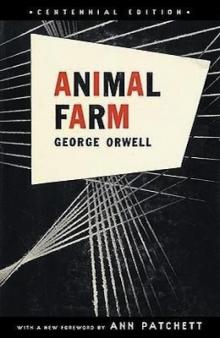 Animal Farm & 1984
Animal Farm & 1984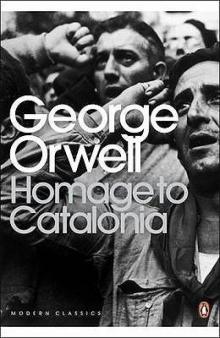 Homage to Catalonia
Homage to Catalonia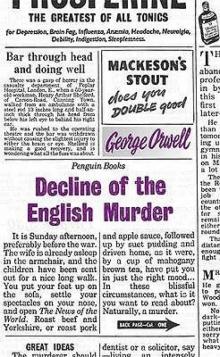 Decline of the English Murder
Decline of the English Murder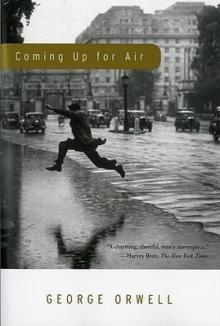 Coming Up for Air
Coming Up for Air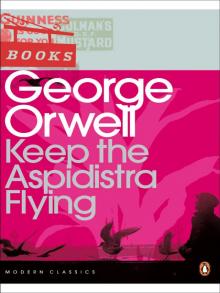 Keep the Aspidistra Flying
Keep the Aspidistra Flying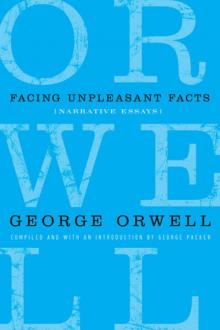 Facing Unpleasant Facts: Narrative Essays
Facing Unpleasant Facts: Narrative Essays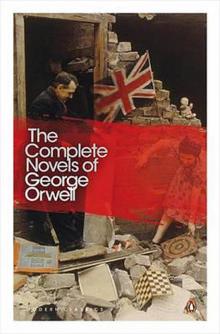 The Complete Novels of George Orwell
The Complete Novels of George Orwell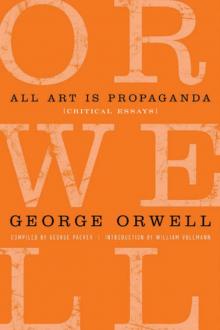 All Art Is Propaganda: Critical Essays
All Art Is Propaganda: Critical Essays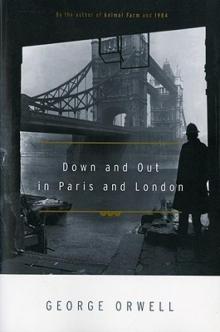 Down and Out in Paris and London
Down and Out in Paris and London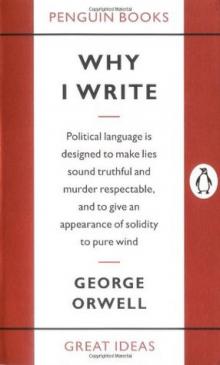 Why I Write
Why I Write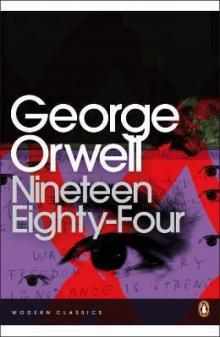 Nineteen Eighty-Four
Nineteen Eighty-Four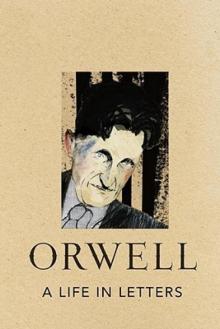 A Life in Letters
A Life in Letters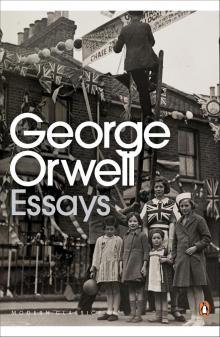 Essays
Essays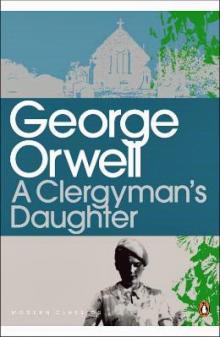 A Clergyman's Daughter
A Clergyman's Daughter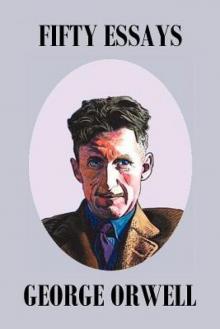 Fifty Orwell Essays
Fifty Orwell Essays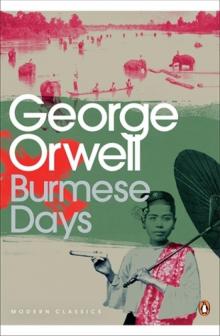 Burmese Days
Burmese Days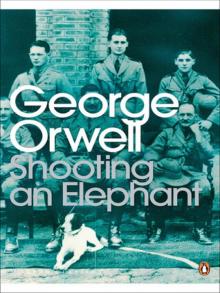 Shooting an Elephant
Shooting an Elephant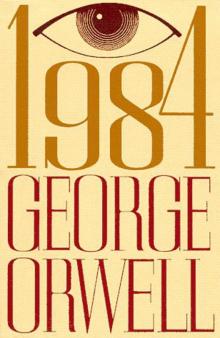 1984 (Penguin)
1984 (Penguin)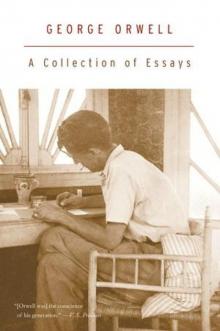 A Collection of Essays
A Collection of Essays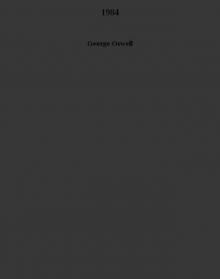 1984
1984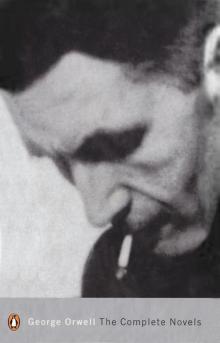 The Complete Novels
The Complete Novels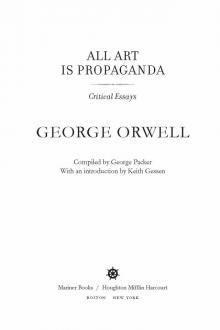 All Art Is Propaganda
All Art Is Propaganda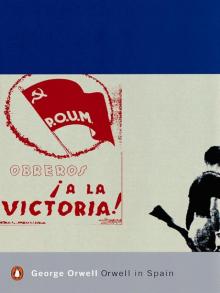 Orwell in Spain
Orwell in Spain Animal Farm: A Fairy Story
Animal Farm: A Fairy Story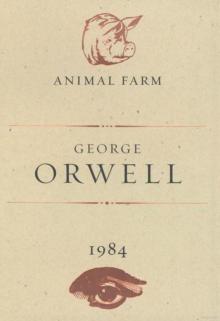 Animal Farm and 1984
Animal Farm and 1984